Jihao Zhao
Inside Out: Evolving User-Centric Core Memory Trees for Long-Term Personalized Dialogue Systems
Jan 08, 2026Abstract:Existing long-term personalized dialogue systems struggle to reconcile unbounded interaction streams with finite context constraints, often succumbing to memory noise accumulation, reasoning degradation, and persona inconsistency. To address these challenges, this paper proposes Inside Out, a framework that utilizes a globally maintained PersonaTree as the carrier of long-term user profiling. By constraining the trunk with an initial schema and updating the branches and leaves, PersonaTree enables controllable growth, achieving memory compression while preserving consistency. Moreover, we train a lightweight MemListener via reinforcement learning with process-based rewards to produce structured, executable, and interpretable {ADD, UPDATE, DELETE, NO_OP} operations, thereby supporting the dynamic evolution of the personalized tree. During response generation, PersonaTree is directly leveraged to enhance outputs in latency-sensitive scenarios; when users require more details, the agentic mode is triggered to introduce details on-demand under the constraints of the PersonaTree. Experiments show that PersonaTree outperforms full-text concatenation and various personalized memory systems in suppressing contextual noise and maintaining persona consistency. Notably, the small MemListener model achieves memory-operation decision performance comparable to, or even surpassing, powerful reasoning models such as DeepSeek-R1-0528 and Gemini-3-Pro.
TAdaRAG: Task Adaptive Retrieval-Augmented Generation via On-the-Fly Knowledge Graph Construction
Nov 16, 2025Abstract:Retrieval-Augmented Generation (RAG) improves large language models by retrieving external knowledge, often truncated into smaller chunks due to the input context window, which leads to information loss, resulting in response hallucinations and broken reasoning chains. Moreover, traditional RAG retrieves unstructured knowledge, introducing irrelevant details that hinder accurate reasoning. To address these issues, we propose TAdaRAG, a novel RAG framework for on-the-fly task-adaptive knowledge graph construction from external sources. Specifically, we design an intent-driven routing mechanism to a domain-specific extraction template, followed by supervised fine-tuning and a reinforcement learning-based implicit extraction mechanism, ensuring concise, coherent, and non-redundant knowledge integration. Evaluations on six public benchmarks and a real-world business benchmark (NowNewsQA) across three backbone models demonstrate that TAdaRAG outperforms existing methods across diverse domains and long-text tasks, highlighting its strong generalization and practical effectiveness.
MoM: Mixtures of Scenario-Aware Document Memories for Retrieval-Augmented Generation Systems
Oct 16, 2025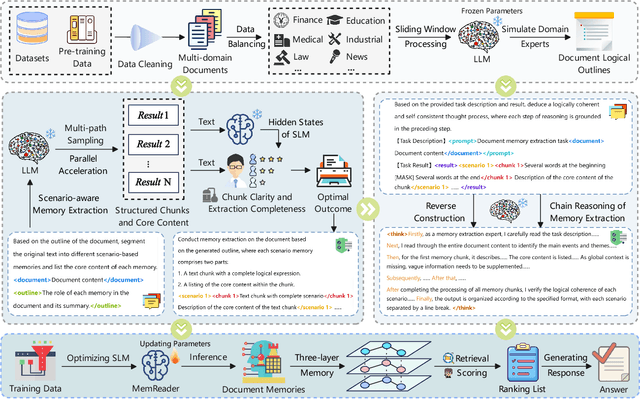
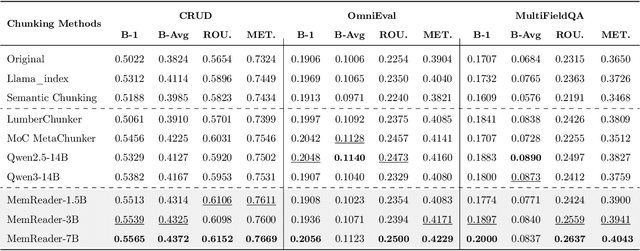
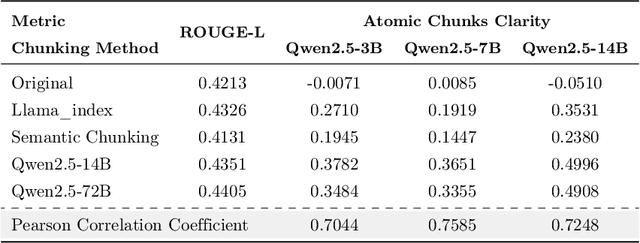
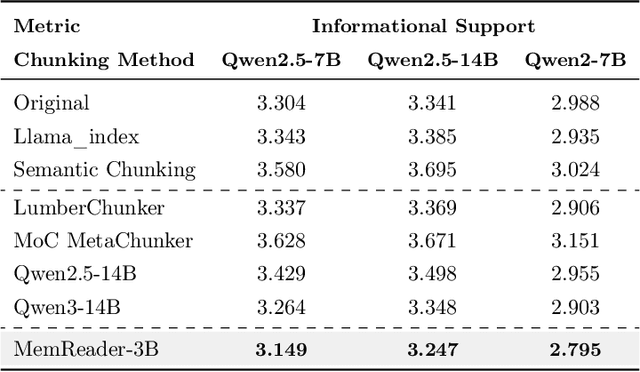
Abstract:The traditional RAG paradigm, which typically engages in the comprehension of relevant text chunks in response to received queries, inherently restricts both the depth of knowledge internalization and reasoning capabilities. To address this limitation, our research transforms the text processing in RAG from passive chunking to proactive understanding, defining this process as document memory extraction with the objective of simulating human cognitive processes during reading. Building upon this, we propose the Mixtures of scenario-aware document Memories (MoM) framework, engineered to efficiently handle documents from multiple domains and train small language models (SLMs) to acquire the ability to proactively explore and construct document memories. The MoM initially instructs large language models (LLMs) to simulate domain experts in generating document logical outlines, thereby directing structured chunking and core content extraction. It employs a multi-path sampling and multi-perspective evaluation mechanism, specifically designing comprehensive metrics that represent chunk clarity and extraction completeness to select the optimal document memories. Additionally, to infuse deeper human-like reading abilities during the training of SLMs, we incorporate a reverse reasoning strategy, which deduces refined expert thinking paths from high-quality outcomes. Finally, leveraging diverse forms of content generated by MoM, we develop a three-layer document memory retrieval mechanism, which is grounded in our theoretical proof from the perspective of probabilistic modeling. Extensive experimental results across three distinct domains demonstrate that the MoM framework not only resolves text chunking challenges in existing RAG systems, providing LLMs with semantically complete document memories, but also paves the way for SLMs to achieve human-centric intelligent text processing.
MemOS: An Operating System for Memory-Augmented Generation (MAG) in Large Language Models
May 28, 2025



Abstract:Large Language Models (LLMs) have emerged as foundational infrastructure in the pursuit of Artificial General Intelligence (AGI). Despite their remarkable capabilities in language perception and generation, current LLMs fundamentally lack a unified and structured architecture for handling memory. They primarily rely on parametric memory (knowledge encoded in model weights) and ephemeral activation memory (context-limited runtime states). While emerging methods like Retrieval-Augmented Generation (RAG) incorporate plaintext memory, they lack lifecycle management and multi-modal integration, limiting their capacity for long-term knowledge evolution. To address this, we introduce MemOS, a memory operating system designed for LLMs that, for the first time, elevates memory to a first-class operational resource. It builds unified mechanisms for representation, organization, and governance across three core memory types: parametric, activation, and plaintext. At its core is the MemCube, a standardized memory abstraction that enables tracking, fusion, and migration of heterogeneous memory, while offering structured, traceable access across tasks and contexts. MemOS establishes a memory-centric execution framework with strong controllability, adaptability, and evolvability. It fills a critical gap in current LLM infrastructure and lays the groundwork for continual adaptation, personalized intelligence, and cross-platform coordination in next-generation intelligent systems.
Invoke Interfaces Only When Needed: Adaptive Invocation for Large Language Models in Question Answering
May 05, 2025Abstract:The collaborative paradigm of large and small language models (LMs) effectively balances performance and cost, yet its pivotal challenge lies in precisely pinpointing the moment of invocation when hallucinations arise in small LMs. Previous optimization efforts primarily focused on post-processing techniques, which were separate from the reasoning process of LMs, resulting in high computational costs and limited effectiveness. In this paper, we propose a practical invocation evaluation metric called AttenHScore, which calculates the accumulation and propagation of hallucinations during the generation process of small LMs, continuously amplifying potential reasoning errors. By dynamically adjusting the detection threshold, we achieve more accurate real-time invocation of large LMs. Additionally, considering the limited reasoning capacity of small LMs, we leverage uncertainty-aware knowledge reorganization to assist them better capture critical information from different text chunks. Extensive experiments reveal that our AttenHScore outperforms most baseline in enhancing real-time hallucination detection capabilities across multiple QA datasets, especially when addressing complex queries. Moreover, our strategies eliminate the need for additional model training and display flexibility in adapting to various transformer-based LMs.
MoC: Mixtures of Text Chunking Learners for Retrieval-Augmented Generation System
Mar 12, 2025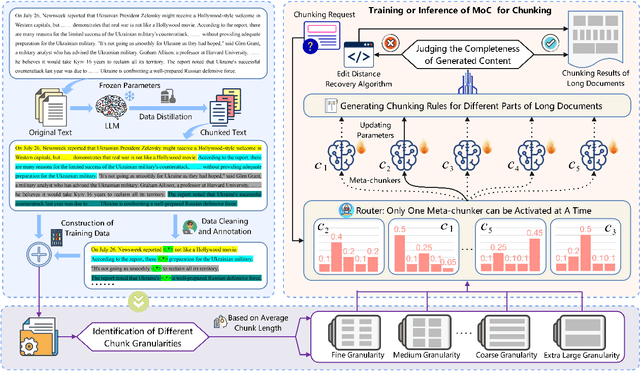
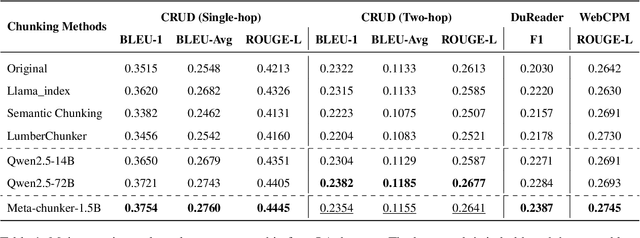
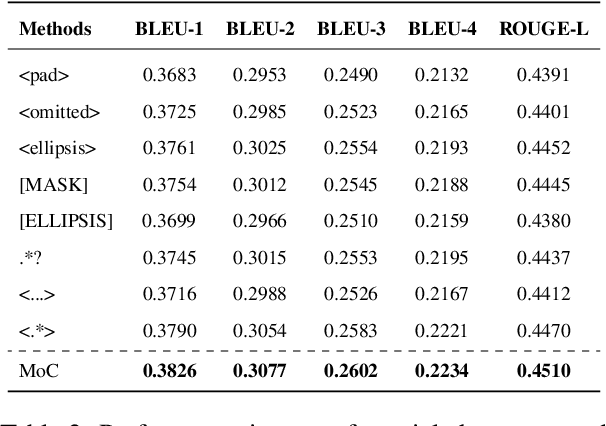

Abstract:Retrieval-Augmented Generation (RAG), while serving as a viable complement to large language models (LLMs), often overlooks the crucial aspect of text chunking within its pipeline. This paper initially introduces a dual-metric evaluation method, comprising Boundary Clarity and Chunk Stickiness, to enable the direct quantification of chunking quality. Leveraging this assessment method, we highlight the inherent limitations of traditional and semantic chunking in handling complex contextual nuances, thereby substantiating the necessity of integrating LLMs into chunking process. To address the inherent trade-off between computational efficiency and chunking precision in LLM-based approaches, we devise the granularity-aware Mixture-of-Chunkers (MoC) framework, which consists of a three-stage processing mechanism. Notably, our objective is to guide the chunker towards generating a structured list of chunking regular expressions, which are subsequently employed to extract chunks from the original text. Extensive experiments demonstrate that both our proposed metrics and the MoC framework effectively settle challenges of the chunking task, revealing the chunking kernel while enhancing the performance of the RAG system.
SEAP: Training-free Sparse Expert Activation Pruning Unlock the Brainpower of Large Language Models
Mar 10, 2025



Abstract:Large Language Models have achieved remarkable success across various natural language processing tasks, yet their high computational cost during inference remains a major bottleneck. This paper introduces Sparse Expert Activation Pruning (SEAP), a training-free pruning method that selectively retains task-relevant parameters to reduce inference overhead. Inspired by the clustering patterns of hidden states and activations in LLMs, SEAP identifies task-specific expert activation patterns and prunes the model while preserving task performance and enhancing computational efficiency. Experimental results demonstrate that SEAP significantly reduces computational overhead while maintaining competitive accuracy. Notably, at 50% pruning, SEAP surpasses both WandA and FLAP by over 20%, and at 20% pruning, it incurs only a 2.2% performance drop compared to the dense model. These findings highlight SEAP's scalability and effectiveness, making it a promising approach for optimizing large-scale LLMs.
Meta-Chunking: Learning Efficient Text Segmentation via Logical Perception
Oct 16, 2024



Abstract:Retrieval-Augmented Generation (RAG), while serving as a viable complement to large language models (LLMs), often overlooks the crucial aspect of text chunking within its pipeline, which impacts the quality of knowledge-intensive tasks. This paper introduces the concept of Meta-Chunking, which refers to a granularity between sentences and paragraphs, consisting of a collection of sentences within a paragraph that have deep linguistic logical connections. To implement Meta-Chunking, we designed two strategies based on LLMs: Margin Sampling Chunking and Perplexity Chunking. The former employs LLMs to perform binary classification on whether consecutive sentences need to be segmented, making decisions based on the probability difference obtained from margin sampling. The latter precisely identifies text chunk boundaries by analyzing the characteristics of perplexity distribution. Additionally, considering the inherent complexity of different texts, we propose a strategy that combines Meta-Chunking with dynamic merging to achieve a balance between fine-grained and coarse-grained text chunking. Experiments conducted on eleven datasets demonstrate that Meta-Chunking can more efficiently improve the performance of single-hop and multi-hop question answering based on RAG. For instance, on the 2WikiMultihopQA dataset, it outperforms similarity chunking by 1.32 while only consuming 45.8% of the time. Our code is available at https://github.com/IAAR-Shanghai/Meta-Chunking.
 Add to Chrome
Add to Chrome Add to Firefox
Add to Firefox Add to Edge
Add to Edge